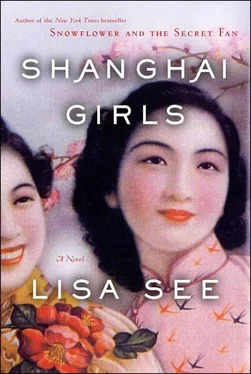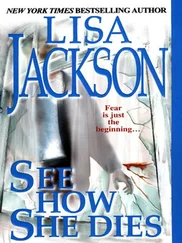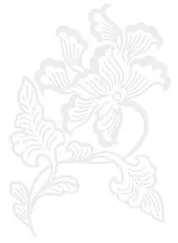Joy gives a half bow to her grandfather, and then the two of us walk to the Methodist church for the Sunday service. As soon as the sermon ends, Joy and I go to the Central Plaza in New Chinatown to meet Sam, May, and Uncle Fred, Mariko, and their daughters at one of the district association halls. We’ve joined a group-a union of sorts-composed of members from the Congregational, Presbyterian, and Methodist churches in Chinatown. We meet once a month. We stand erect and proud, place our hands over our hearts, and recite the Pledge of Allegiance. Then all the families troop out to Bamboo Lane and pile into sedans for the drive to Santa Monica Beach. Sam, May, and I sit together in the front seat of our Chrysler, Joy and the two Yee girls-Hazel and her younger sister, Rose-squeeze together in the backseat, and then we head west in a caravan along Sunset Boulevard. Cars with huge fins shoot ahead of us, their windshields flashing in the summer glare. We go by old-fashioned clapboard houses in Echo Park and pink stucco mansions and rat-proofed palms in Beverly Hills, where we cut over to Wilshire Boulevard and continue west past supermarkets as massive as B-29 hangars, parking lots and lawns as big as football fields, and cascades of bougainvillea and morning glories.
Joy’s voice rises as she presses a point to Hazel and Rose, and I smile to myself. Everyone says my daughter has my gift for languages. At age fourteen, her Sze Yup and Wu dialects are as perfect as her English, and her mastery of written Chinese is excellent too. Each Chinese New Year or if someone is celebrating a happy occasion, people ask Joy to write appropriate couplets in her fine calligraphy, which is said by all to be tong gee- uncorrupted by adulthood. This praise isn’t enough for me. I know Joy can obtain more spiritual growth and learn more about Caucasians by going to church outside Chinatown, which we do once a month.
“God loves everyone,” I often remind my daughter. “He wants you to make a good living and have a happy life. This is true about America too. You can do anything in the U.S. You can’t say that about China.”
I tell Sam things like this too, because the Christian words and beliefs have taken deep root in me. My faith in God and Jesus is also very much a part of the patriotism and loyalty I feel for my daughter’s home country of America. And of course, being Christian these days is deeply tied to anti-Communist sentiment. No one wants to be accused of being a godless Communist. When asked about the war in Korea, we say we’re against Red China’s interference; when asked about Taiwan, we say we support the Generalissimo and Madame Chiang Kai-shek. We say we’re for moral rearmament, Jesus, and freedom. Going to a Western church is a practical thing to do, just as my going to a mission in Shanghai was. “You have to be sensible about these things,” I’ve told Sam, but inside I’ve become a one-Goder and he knows it.
Sam may not like it, but he comes to our church gatherings because he loves me, our family, Uncle Fred and his brood of girls, and these picnics. Our outings make him feel American. In fact, although our daughter has finally grown out of her cowgirl infatuation, almost everything we do makes us feel more American. On days like today, Sam ignores the God aspects and embraces the things he likes: preparing the food, eating slices of watermelon that we don’t have to worry have been injected with foul river water, and celebrating family fellowship. He considers these adventures purely social and purely for the children.
Sam pulls into a parking spot by the Santa Monica Pier, and we unload the car. Our feet burn as we cross the sand, roll out blankets, and set up umbrellas. Sam and Fred help the other men dig a pit for the barbecue. May, Mariko, and I assist the other wives and mothers setting out bowls of potato, bean, and fruit salads; Jell-O molds with marshmallows, walnuts, and grated carrots; and plates of cold cuts. As soon as the fire is ready, we give the men trays of chicken wings marinated in soy, honey and sesame seeds, and pork ribs steeped in hoisin sauce and five spice. The ocean air mixes with the scent of the roasting meat, children play in the surf, the men bend their heads over the barbecue, and the women sit on blankets and gossip. Mariko stands apart from us. She holds baby Mamie on her hip, while keeping a close eye on her other half-and-half daughters, Eleanor and Bess, who are building a sand castle.
My sister, childless, is known as Auntie May to everyone. Like Sam, she isn’t a one-Goder. Far from it! She works hard, sometimes staying up late to arrange extras for a shoot or staying out all night on a set herself At least that’s what she says. I honestly don’t know where she goes, and I don’t ask. Even when she’s home and asleep, the phone might ring at four or five in the morning, a call from someone who’s just lost all his money gambling and needs a job. None of this, none of this , matches well with my one-God beliefs, which is one reason I like to bring her on these excursions to the seashore.
“Look at that FOB,” May says, adjusting her sunglasses and big hat. She tips her head delicately toward Violet Lee, who shades her eyes with her long, tapered fingers and peers out to the ocean, where Joy and her friends hold hands and jump over waves. Plenty of women here, including Violet, are fresh off the boat. Now almost forty percent of the Chinese population in Los Angeles is made up of women, but Violet wasn’t a war bride or a fiancée. She and her husband came to UCLA to study: she bioengineering, Rowland engineering. When China closed, they were trapped here with their young son. They aren’t paper sons, paper partners, or laborers, but they’re still wang k’uo nu- lost-country slaves.
Violet and I get along well. She has narrow hips, which Mama always said marked a woman with the gift of gab. Are we best friends? I sneak a glance at my sister. Never. Violet and I are good friends, like Betsy and I once were. May will always be not only my sister and my sister-in-law but also my best friend, forever. That said, May doesn’t know what she’s talking about. While it’s true that many of the new women do seem FOB-just as we once did-most of them are exactly like Violet: educated, arriving in this country with their own money, not having to spend even a single night in Chinatown but buying bungalows and homes in Silver Lake, Echo Park, or Highland Park, where Chinese are welcomed. Not only do they not live in Chinatown, but they don’t work there either. They aren’t laundrymen, houseboys, restaurant workers, or curio-shop clerks. They’re the cream of China -the ones who could afford to leave. Already they’ve gone further than we ever could. Violet now teaches at USC, and Rowland works in the aerospace industry. They come to Chinatown only to go to church and to buy groceries. They’ve joined our group so their son can meet other Chinese children.
May eyes a young man. “You think that FOB wants our ABC?” She asks suspiciously. The FOB she’s speaking of is Violet’s son; the ABC is my American-born Chinese daughter.
“ Leon ’s a sweet boy and a good student,” I say, watching as the boy dives smoothly into the surf. “He’s at the top of his class at his school, just as our Joy is at the top of hers.”
“You sound like Mama talking about Tommy and me,” May teases.
“It’s not so bad if Leon and Joy get to know each other,” I respond steadily, for once not offended that she’s compared me with our mother. After all, the reason this union exists is that we want the boys and girls to get to know each other, hoping they’ll marry one day. Implicit in this is the expectation that they’ll marry someone Chinese.
“She’s lucky she won’t have an arranged marriage.” May sighs. “But even with animals, you want a thoroughbred, not a mongrel.”
Читать дальше












